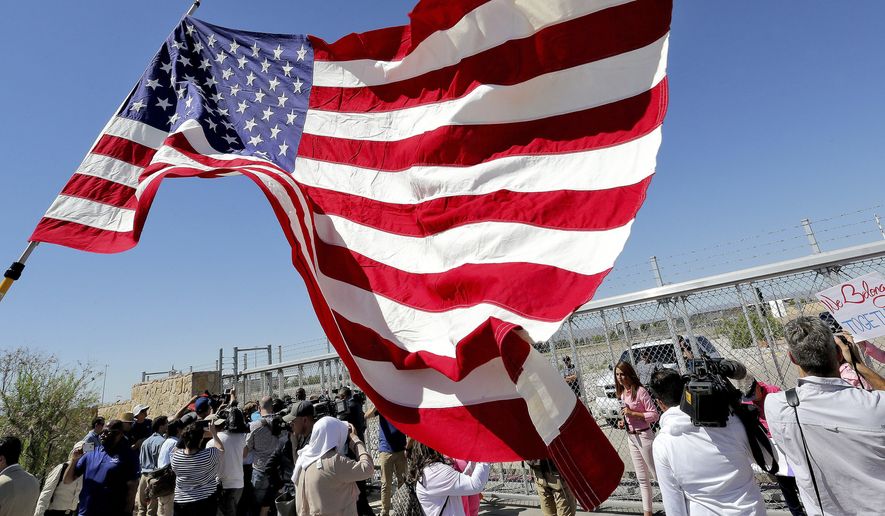The administration poked holes in its own zero-tolerance immigration policy Monday after the man who oversees the Border Patrol said they are no longer prosecuting illegal immigrant parents and the White House said they are out of resources to hold them anyway.
U.S. Customs and Border Protection Commissioner Kevin McAleenan blamed President Trump’s new executive order halting family separations for the end to prosecutions of parents.
“We’re not prosecuting those parents,” Mr. McAleenan told reporters at the border in Texas, according to the Los Angeles Times.
A frustrated Mr. Trump lashed out at the entire system, wondering why the U.S. allowed migrants access to immigration courts and appeals that can take years to complete.
“People must simply be stopped at the Border and told they cannot come into the U.S. illegally. Children brought back to their country,” the president tweeted Monday. “If this is done, illegal immigration will be stopped in it’s tracks — and at very little, by comparison, cost.”
Trump critics, including television networks CNN and MSNBC, said the president wanted to deny illegal immigrants due process. Criminal defense lawyers said Mr. Trump was undercutting the fabric of constitutional rights.
The White House countered that what the president really had in mind was expanding the use of tools such as expedited removal, a process used by the Clinton, Bush and Obama administrations to deport hundreds of thousands of newly arrived illegal immigrants without going through the full immigration court system.
“Just because you don’t see a judge doesn’t mean you aren’t receiving due process,” White House press secretary Sarah Huckabee Sanders said.
The administration continues to try to find its footing nearly a week after Mr. Trump reversed himself and signed an executive order ending family separations.
In that order, Mr. Trump directed the Department of Homeland Security to maintain his zero-tolerance policy, which involves bringing criminal cases against those who try to sneak into the U.S. without going through an official port of entry.
He said the government should continue to prosecute the cases but said parents would be held with their children in immigration detention rather than separated while the parents are taken to jail.
Yet Mr. McAleenan said Monday that it’s impossible to keep the families together and prosecute. He said the agency has had to enact a temporary halt in referrals, and he is working on a plan to try to restart them.
If the Border Patrol isn’t referring people to the local U.S. attorneys, that means the lawyers can’t prosecute the cases.
Mrs. Sanders didn’t deny Mr. McAleenan’s statement but blamed lack of money or space to hold migrants, not the president’s executive order.
“We’re not changing the policy. We’re simply out of resources,” she said, adding that it is up to Congress now to step in and change the laws.
Prosecutions were key to the zero-tolerance policy, which sought to change the calculus for would-be migrants considering making the trip north. In theory, the prosecutions would have included significant jail time and the criminal record would be a hindrance for legal immigration.
In practice, illegal immigrants served just a couple of days in jail, were sentenced to time served and then released back to immigration authorities, who would then detain them for a short time and usually release them into the country.
The biggest effect came with parents who arrived with children. Because the children couldn’t be sent to the criminal justice system jails, they were declared unaccompanied alien children and transferred to dorms run by the Health and Human Services Department. Now thousands of parents are struggling to reunite with those children.
Democrats had planned to use a committee vote Tuesday in Congress to offer amendments to prod the administration on family separations.
House Republicans abruptly canceled the committee action Monday afternoon, heading off possibly embarrassing votes.
More than 2,000 children separated from parents were still in HHS shelters waiting to be reunited at the time Mr. Trump signed his executive order last week.
In court papers Monday, advocates for the children said there is no plan to reunite them and no real mechanism to do so, even if the government had a plan.
Mr. McAleenan’s agency, CBP, doesn’t share computer systems with U.S. Immigration and Customs Enforcement, the agency that takes custody of the parents. The Health and Human Services Department’s office of refugee resettlement, which has the separated children, is completely divorced from ICE and CBP systems, analysts said.
“ORR’s reunification process was not designed to deal with the situation of children who come to the United States with their parents, and then are removed from their parents’ care by DHS,” Robert Carey, who led the office of refugee resettlement at the end of the Obama administration, said in a court ruling Monday.
Even the 1-800 number hotline that the government set up to help parents track their children is a mess, said the analysts, pointing to parents who had calls dropped or who were told to wait on hold for 30 minutes — something parents sitting in an immigration detention facility cannot do.
The hotline also works only in the U.S., so parents who were deported without their children can’t even use it, Jennifer Podkul, director of Kids in Need of Defense, said in a court declaration.
A judge gave the Justice Department until Tuesday morning to respond.
• Stephen Dinan can be reached at sdinan@washingtontimes.com.




Please read our comment policy before commenting.